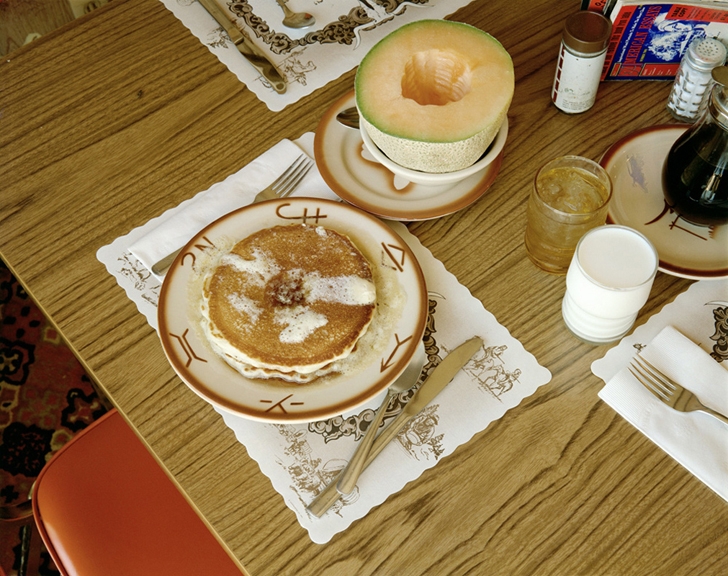The pictorial field in Stephen Shore’s photograph Lookout Hotel, Ogunquit, Maine, July 16, 1974 is occupied almost entirely by a partially completed jigsaw puzzle. The puzzle’s pieces are spread across a mustard-yellow tablecloth, its synthetic material stitched with a simple pattern that lends it a cushioned texture. Pink-and-white embroidered chair-seats can be seen on the sides of the table, and beyond the chairs an Oriental rug extends, slightly out of focus, to the edge of the photograph’s frame. The compressed layering of truncated patterns creates no depth; the camera angle is such that the table seems to tilt upward, threatening to spill the entire puzzle onto the floor; it almost feels like we might as well be in a Manet interior or a Cézanne still-life as in a motel in rural Maine in the 1970s.
While a striking photograph in itself, Lookout Hotel, in its specific depiction of a jigsaw puzzle, also serves as something of an emblem for Shore’s fuller artistic modus operandi. Like jigsaw-puzzle pieces, Shore’s individual photographs transmit a sense of fragmentation and incompleteness, yet each is shaped with such meticulous craft that they often feel nothing short of inevitable. And at the same time, his images come together (or can be made to come together) to form another image, an aggregate, interlocking, puzzle-like portrait of the overarching subjects of his photographic series (usually determined by place). While these traits are especially prominent in the series Uncommon Places (1973–81) – a rambling, cross-country, on-the-road portrait of the United States – they are in fact present across the arc of his long career, from his portraits of Andy Warhol’s coterie during the mid-1960s to his recent photographs from Ukraine, as is made clear by this judiciously selected and impeccably presented overview.
Shore’s photographs transmit a sense of fragmentation and incompleteness, yet each is shaped with such meticulous craft that they often feel nothing short of inevitable
As evidenced in it, Shore’s work is insistently formal – but formal in a dual sense. On the one hand, it is at all times concerned with form, composition, surface, line and colour, through which it achieves its characteristically muted (but nonetheless extraordinary) beauty. But it is also formal in the sense of formality, of seeming to actively suppress all signs of spontaneity, to seek and maintain a kind of studied distance, even when it partakes of the conventions of the snapshot. For instance, an exquisitely composed photo such as J.J. Summers Agency, First Street, Duluth, Minnesota, July 11, 1973 (1973) depicts a quiet, nearly empty storefront – there is something almost Hopper-like in the pathos of the lonely adding machine, crank upraised, being offered for sale in the streetfront window. In Washington Street, Watertown, New York, August 1, 1974 (1974), meanwhile, a woman strides towards the camera, dressed in a light-green pantsuit and surrounded by the sidewalk’s unkempt weeds and foliage, the soloist in a sudden morning’s symphony of green. And Trail’s End Restaurant, Kanab, Utah, August 10, 1973 (1973) converts a breakfast special at what is presumably a roadside diner into a carefully composed constellation of circles, dominated by an oversize pile of butterdrenched pancakes.
This same tabletop depicted in Trail’s End Restaurant also contains a barely noticeable popular magazine entitled American Essays, perhaps making a sly reference to Walker Evans’s American Photographs (1938). If so, the reference is unnecessary, for Evans’s spirit pervades Shore’s work in myriad ways: in its scrutiny, in its compositional mastery and above all in its capacity to convey – beyond documentation, beyond narrative, even beyond beauty – an incontrovertible sense of place.
This article was first published in the January & February 2015 issue.
